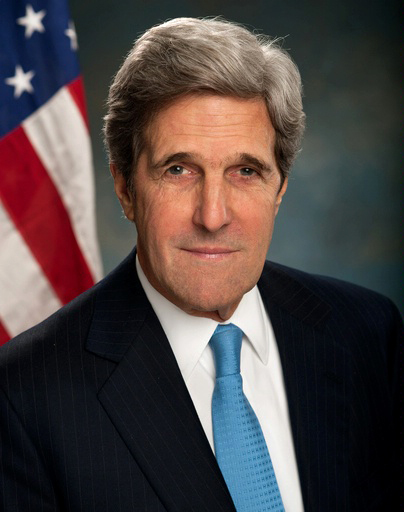 On March 4, 2014, CNN covered a speech by U.S. Secretary of State John Kerry in Kiev, Ukraine. Kerry stated, “They would have you believe that ethnic Russians and Russian bases are threatened. They would have you believe the Kiev was trying to destabilize Crimea or that Russian actions were legal or legitimate because Crimean leaders invited intervention. And as everybody knows the soldiers in Crimea, at the instruction of their government, had stood their ground, had never fired a shot, never issued one provocation.”
On March 4, 2014, CNN covered a speech by U.S. Secretary of State John Kerry in Kiev, Ukraine. Kerry stated, “They would have you believe that ethnic Russians and Russian bases are threatened. They would have you believe the Kiev was trying to destabilize Crimea or that Russian actions were legal or legitimate because Crimean leaders invited intervention. And as everybody knows the soldiers in Crimea, at the instruction of their government, had stood their ground, had never fired a shot, never issued one provocation.”
Kerry accused Russia of doing exactly what the United States did to the Hawaiian 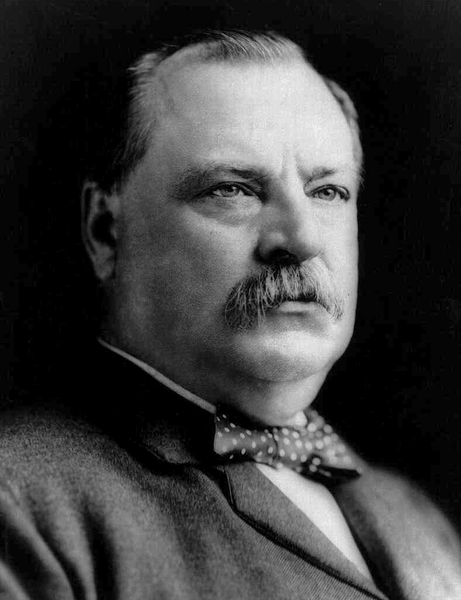 Kingdom in January 1893. Unlike the Crimean dispute, however, the Hawaiian dispute was settled by U.S. President Grover Cleveland after he initiated an investigation into the overthrow of the Hawaiian government
Kingdom in January 1893. Unlike the Crimean dispute, however, the Hawaiian dispute was settled by U.S. President Grover Cleveland after he initiated an investigation into the overthrow of the Hawaiian government at the request of Queen Lili‘uokalani, Hawaiian Head of State, in March 1893. At the center of the investigation were the actions taken by U.S. Minister Plenipotentiary John Stevens
at the request of Queen Lili‘uokalani, Hawaiian Head of State, in March 1893. At the center of the investigation were the actions taken by U.S. Minister Plenipotentiary John Stevens 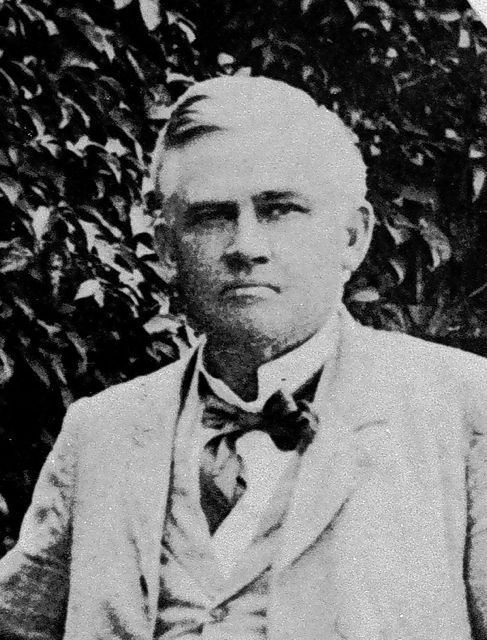 and the commander of U.S. troops aboard the U.S.S. Boston anchored in Honolulu Harbor, Captain Gilbert Wiltse. The intervention occurred during President Benjamin Harrison’s administration. The President appointed James Blount as Special Commissioner who submitted reports between April and July 1893 to U.S. Secretary of State Walter Gresham. The investigation was concluded by Gresham on October 18, 1893. President Cleveland notified the Congress of the conclusion of the investigation by presidential message on December 18, 1893, while negotiations were still taking place with the Queen in Honolulu.
and the commander of U.S. troops aboard the U.S.S. Boston anchored in Honolulu Harbor, Captain Gilbert Wiltse. The intervention occurred during President Benjamin Harrison’s administration. The President appointed James Blount as Special Commissioner who submitted reports between April and July 1893 to U.S. Secretary of State Walter Gresham. The investigation was concluded by Gresham on October 18, 1893. President Cleveland notified the Congress of the conclusion of the investigation by presidential message on December 18, 1893, while negotiations were still taking place with the Queen in Honolulu.
The investigation determined that the United States unlawfully intervened in the internal affairs of the Hawaiian Kingdom, and that its diplomat and troops were directly responsible for the illegal overthrow of the Hawaiian government. Gresham recommended to President Cleveland that the Hawaiian government must be restored and compensation must be provided. This prompted executive mediation between President Cleveland and Queen Lili‘uokalani to settle the dispute and by exchange of notes an executive agreement, called the “Agreement of Restoration,” was concluded whereby the President committed to the restoration of the Hawaiian government and the Queen, thereafter, to grant amnesty to the insurgents. The President did not carry out the international agreement because of political wrangling in the Congress, and President Cleveland’s successor, William McKinley, unilaterally seized the Hawaiian Islands during the Spanish-American War on August 12, 1898. Hawai‘i has been under an illegal and prolonged occupation ever since.
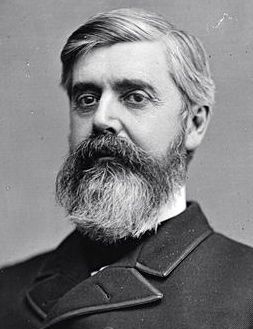 Here follows Gresham’s report to President Cleveland regarding U.S. intervention in Hawai‘i that took place under President Benjamin Harrison’s administration.
Here follows Gresham’s report to President Cleveland regarding U.S. intervention in Hawai‘i that took place under President Benjamin Harrison’s administration.
Department of State,
Washington, October 18, 1893
The President:
The full and impartial reports submitted by the Hon. James H. Blount, your special commissioner to the Hawaiian Islands, established the following facts:
Queen Liliuokalani announced her intention on Saturday, January 14, 1893, to proclaim a new constitution, but the opposition of her ministers and other induced her to speedily change her purpose and make public announcement of that fact.
At a meeting in Honolulu, late on the afternoon of that day, a so-called committee of public safety, consisting of thirteen men, being all or nearly all who were present, was appointed “to consider the situation and devise ways and means for the maintenance of the public peace and the protection of life and property,” and at a meeting of this committee on the 15th, or the forenoon of the 16th of January, it was resolved amongst other things that a provisional government be created “to exist until terms of union with the United States of America have been negotiated and agreed upon.” At a mass meeting which assembled at 2 p.m. on the last named day, the Queen and her supporters were condemned and denounced, and the committee was continued and all its act approved.
Later the same afternoon the committee addressed a letter to John L. Stevens, the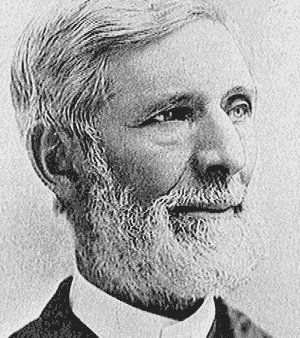 American minister at Honolulu, stating that the lives and property of the people were in peril and appealing to him and the United States forces at his command for assistance. This communication concluded “we are unable to protect ourselves without aid, and therefore hope for the protection of the United States forces.” On receipt of this letter Mr. Stevens requested
American minister at Honolulu, stating that the lives and property of the people were in peril and appealing to him and the United States forces at his command for assistance. This communication concluded “we are unable to protect ourselves without aid, and therefore hope for the protection of the United States forces.” On receipt of this letter Mr. Stevens requested 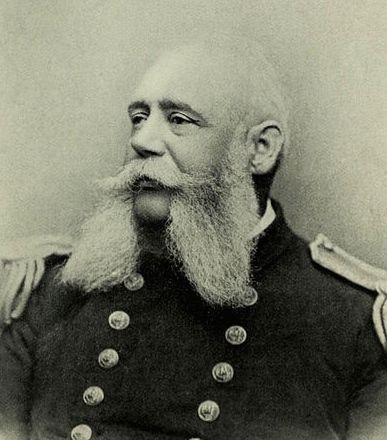 Capt. Wiltse, commander of the U.S.S. Boston, to land a force “for the protection of the United States legation, United States consulate, and to secure the safety of American life and property.” The well armed troops, accompanied by two gatling guns, were promptly landed and marched through the quiet streets of Honolulu to a public hall, previously secured by Mr. Stevens for their accommodation. This hall was just across the street form the government building, and in plain view of the Queen’s palace. The reason for thus locating the military will presently appear. The governor of the Island immediately addressed to Mr. Stevens a communication protesting against the act as an unwarranted invasion of Hawaiian soil and reminding him that the proper authorities had never denied permission to the naval forces of the United States to land for drill or any other proper purpose.
Capt. Wiltse, commander of the U.S.S. Boston, to land a force “for the protection of the United States legation, United States consulate, and to secure the safety of American life and property.” The well armed troops, accompanied by two gatling guns, were promptly landed and marched through the quiet streets of Honolulu to a public hall, previously secured by Mr. Stevens for their accommodation. This hall was just across the street form the government building, and in plain view of the Queen’s palace. The reason for thus locating the military will presently appear. The governor of the Island immediately addressed to Mr. Stevens a communication protesting against the act as an unwarranted invasion of Hawaiian soil and reminding him that the proper authorities had never denied permission to the naval forces of the United States to land for drill or any other proper purpose.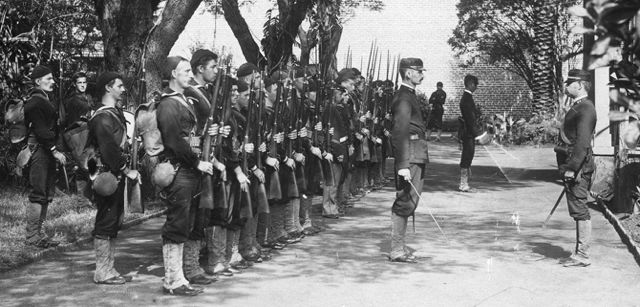
About the same time the Queen’s minister of foreign affairs sent a note to Mr. Stevens asking why the troops had been landed and informing him that the proper authorities were able and willing to afford full protection to the American legation and all American interests in Honolulu. Only evasive replies were sent to these communications.
While there were no manifestations of excitement or alarm in the city, and the people were ignorant of the contemplated movements, the committee entered the Government building, after first ascertaining that it was unguarded, and read a proclamation declaring that the existing Government was overthrown and a Provisional Government established in its place, “to exist until terms of union with the United States of America have been negotiated and agreed upon.” No audience was present when the proclamation was read, but during the reading 40 to 50 men, some of them indifferently armed, entered the room. The executive and advisory councils mentioned in the proclamation at once addressed a communication to Mr. Stevens, informing him that the monarchy had been abrogated and a provisional government established. This communication concluded:
Such Provisional Government has been proclaimed, is now in possession of the Government departmental buildings, the archives, and the treasury, and is in control of the city. We hereby request that you will, on behalf of the United States, recognize it as the existing de facto Government of the Hawaiian Islands and afford to it the moral support of your Government, and, if necessary, the support of American troops to assist in preserving the public peace.
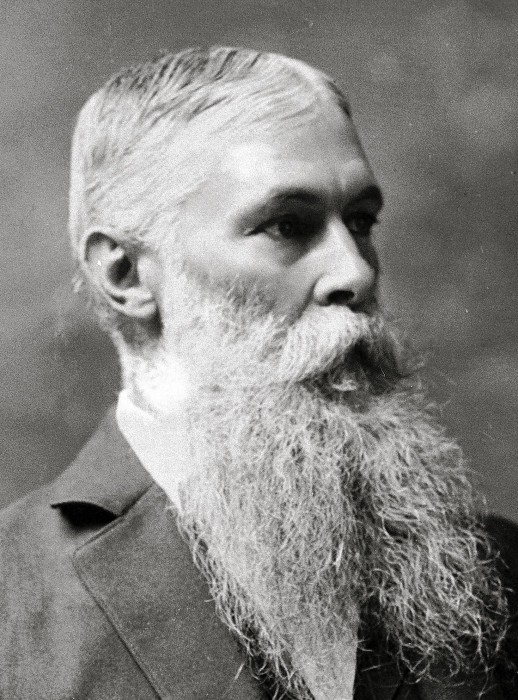 On receipt of this communication, Mr. Stevens immediately recognized the new Government, and, in a letter addressed to Sanford B. Dole, its President, informed him that he had done so. Mr. Dole replied:
On receipt of this communication, Mr. Stevens immediately recognized the new Government, and, in a letter addressed to Sanford B. Dole, its President, informed him that he had done so. Mr. Dole replied:
Government Building,
Honolulu, January 17, 1893
Sir: I acknowledge receipt of your valued communication of this day, recognizing the Hawaiian Provisional Government, and express deep appreciation of the same.
We have conferred with the ministers of the late Government, and have made demand upon the marshal to surrender the station house. We are not actually yet in possession of the station house, but as night is approaching and our forces may be insufficient to maintain order, we request the immediate support of the United States forces, and would request that the commander of the United States forces take command of our military forces, so that they may act together for the protection of the city.
Respectfully, yours,
Sanford B. Dole,
Chaiman Executive Council.
His Excellency John L. Stevens,
United States Minister Resident.
Note of Mr. Stevens at the end of the above communication.
“The above request not complied with.”
Stevens.
The station house was occupied by a well armed force, under the command of a resolute capable, officer. The same afternoon the Queen, her ministers, representatives of the Provisional Government, and other held a conference at the palace. Refusing to recognize the new authority or surrender to it, she was informed that the Provisional Government had the support of the American minister, and, if necessary, would be maintained by the military force of the United States then present; that any demonstration on her part would precipitate a conflict with that force; that she could not, with hope of success, engage in war with the United States, and that resistance would result in a useless sacrifice of life. Mr. Damon, one of the chief leader of the movement, and afterwards vice-president of the Provisional Government, informed the Queen that she could surrender under protest and her case would be considered later at Washington. Believing that, under the circumstances, submission was a duty, and that her case would be fairly considered by the President of the United States, the Queen finally yielded and sent to the Provisional Government the paper, which reads:
“I, Lili‘uokalani, by the grace of God and under the constitution of the Hawaiian Kingdom, Queen, do hereby solemnly protest against any and all acts done against myself and the constitutional Government of the Hawaiian Kingdom by certain persons claiming to have established a provisional government of and for this Kingdom.
That I yield to the superior force of the United States of America whose Minister Plenipotentiary, His Excellency John L. Stevens, has caused United States troops to be landed at Honolulu and declared that he would support the provisional government.
Now to avoid any collision of armed forces, and perhaps the loss of life, I do this under protest and impelled by said force yield my authority until such time as the Government of the United States shall, upon facts being presented to it, undo the action of its representatives and reinstate me in the authority which I claim as the Constitutional Sovereign of the Hawaiian Islands.”
When this paper was prepared at the conclusion of the conference, and signed by the Queen and her ministers, a number of persons, including one or more representatives of the Provisional Government, who were still present and understood its contents, by their silence, at least, acquiesced in its statements, and, when it was carried to President Dole, he indorsed upon it, “Received from the hands of the late cabinet this 17th day of January, 1893,” without challenging the truth of any of its assertions. Indeed, it was not claimed on the 17th day of January, or for some time thereafter, by any of the designated officers of the Provisional Government or any annexationist that the Queen surrendered otherwise than as stated in her protest.
In his dispatch to Mr. Foster of January 18, describing the so-called revolution, Mr. Stevens says:
The committee of public safety forthwith took possession of the Government building, archives, and treasury, and installed the Provisional Government at the head of the respective departments. This being an accomplished fact, I promptly recognized the Provisional Government as the de facto government of the Hawaiian Islands.
In Secretary Foster’s communication of February 15 to the President, laying before him the treaty of annexation, with the view to obtaining the advice and consent of the Senate thereto, he says:
At the time the Provisional Government took possession of the Government building no troops or officers of the United States were present or took any part whatever in the proceedings. No public recognition was accorded to the Provisional Government by the United States minister until after the Queen’s abdication, and when they were in effective possession of the Government building, the archives, the treasury, the barracks, the police station, and all the potential machinery of the Government.
Similar language is found in an official letter addressed to Secretary Foster on February 3 by the special commissioners sent to Washington by the Provisional Government to negotiate a treaty of annexation.
These statements are utterly at variance with the evidence, documentary and oral, contained in Mr. Blount’s reports. They are contradicted by declarations and letters of President Dole and other annexationists and by Mr. Stevens’s own verbal admissions to Mr. Blount. The Provisional Government was recognized when it had little other than a paper existence, and when the legitimate government was in full possession and control of the palace, the barracks, and the police station. Mr. Stevens’s well known hostility and the threatening presence of the force landed from the Boston was all that could then have excited serious apprehension in the minds of the Queen, her officers, and loyal supporters.
It is fair to say that Secretary Foster’s statements were based upon information which he had received from Mr. Stevens and the special commissioners, but I am unable to see that they were deceived. The troops were landed, not to protect American life and property, but to aid in overthrowing the existing government. Their very presence implied coercive measures against it.
In a statement given to Mr. Blount, by Admiral Skerret, the ranking naval officer at Honolulu, he says:
“If the troops were landed simply to protect American citizens and interests, they were badly stationed in Arion Hall, but if the intention was to aid the Provisional Government they were wisely stationed.”
This hall was so situated that the troops in it easily commanded the Government building, and the proclamation was real under the protection of American guns. At an early stage of the movement, if not at the beginning, Mr. Stevens promised the annexationists that as soon as they obtained possession of the Government building and there read a proclamation of the character above referred to, he would at once recognize them as a de facto government, and support them by landing a force from our war ship then in the harbor, and he kept that promise. This assurance was the inspiration on the movement, and without it the annexationists would not have exposed themselves to the consequences of failure. They relied upon no military force of their own, for they had none worthy of the name. The Provisional Government was established by the action of the American minister and the presence of the troops landed from the Boston, and its continued existence is due to the belief of the Hawaiians that if they made an effort to overthrow it, they would encounter the armed forces of the United States.
The earnest appeals to the American minister for military protection by the officers of that Government, after it had been recognized, show the utter absurdity of the claim that it was established by a successful revolution of the people of the Islands. Those appeals were a confession by the men who made them of their weakness and timidity. Courageous men, conscious of their strength and the justice of their cause, do not thus act. It is not now claimed that a majority of the people, having the right to vote under the constitution of 1887, ever favored the existing authority or annexation to this or any other country. They earnestly desire that the government of their choice shall be restored and its independence respected.
Mr. Blount states that while at Honolulu he did not meet a single annexationist who expressed willingness to submit the question to a vote of the people, nor did he talk with one on that subject who did not insist that if the Islands were annexed suffrage should be so restricted as to give complete control to foreigners or whites. Representative annexationists have repeatedly made similar statements to the undersigned.
The Government of Hawaii surrendered its authority under a threat of war, until such time only as the Government of the United States, upon the facts being presented to it, should reinstate the constitutional sovereign, and the Provisional Government was created “to exist until terms of union with the United States of America have been negotiated and agreed upon.” A careful consideration of the fact will, I think, convince you that the treaty which was withdrawn from the Senate for further consideration should not be resubmitted for its action thereon.
Should not the great wrong done to a feeble but independent State by an abuse of the authority of the United States be undone by restoring the legitimate government? Anything short of that will not, I respectfully submit, satisfy the demands of justice.
Can the United States consistently insist that other nations shall respect the independence of Hawaii while not respecting it themselves? Our Government was the first to recognize the independence of the Islands and it should be the last to acquire sovereignty over them by force and fraud.
Respectfully submitted.
W.Q. Gresham.

The TRUTH regarding the illegal overthrow and the continued illegal occupation of Hawaii by the United States is being revealed even more with what is happening in Crimea. ILLEGAL OCCUPATION & VIOLATION OF INTERNATIONAL LAW!!!
Interesting very interesting……..
Aloha kakou.
Theo Davies the British guardian of Princess Ka’iulani in conversation kept referring to U.S. Minister John L. Stevens as a snake in the grass.
If it is okay I should like to follow up a little on the Crimea and trust it will not bore readers or be seen as off-topic.
The media (various agencies) were reporting the other day that Russian troops were seen digging-in on high ground at the Perekop isthmus, the Perekop isthmus has no high ground, any altitude is measured in inches it is as flat as a pancake. The original source appeared to have been the reputable BBC News website, certainly a BBC crew witnessed the process but they to their credit never stated it was high ground, it was most likely the Tartar fosse which is only a ditch.
As noted in the previous posting Gottlob Bidermann served in Crimea during WWII, he gave an exquisite account of the topography:
“Running through the Crimean Peninsula in an easterly direction toward the Black Sea are three large valley ranges; the Alma, Katscha, and Belbek. The northern part of the peninsula is a vast salt steppe. Long basins for salt production were located here where the water from the Sivasch could be easily evaporated, leaving precious salt lining the basins, which was rare and difficult to obtain in many other regions of Russia.
During our advance through the Ukraine we had noted how salt was used as a source of trade among the inhabitants, and it was more valued here than in our homeland. Demonstrating to us the high value placed on this precious commodity, peasant women presented us with platters of salt and bread as an offering of welcome as we passed through villages.
The central Crimea is a flat, nearly treeless plain that nevertheless is fertile and well tended. Here, as throughout the Soviet empire, the farms had been placed under control of the collectives, the kolkhoz establishment. In the winter months snow and ice storms sweep over the region from the eastern Ukraine.
The Yaila mountains lie in the south. They rise steeply to a height of two thousand meters and then fall sharply into the Black Sea on the southern coast. These mountains are thickly wooded, and the valleys running to the north bear heavy vegetation. Fruit plantations are seen here, along with the picturesque villages of the Tartars.”
It is pleasing to see how the spirit of Aloha is practiced in different cultures, and how agricultural people around the world have so much in common with crop harvesting and the vagaries of the weather. Aloha.
Exactly the same occurred in Puerto Rico five years later, with the Hispano American Cuban War. in which Puerto Rico was invaded and is still occupied by the United States Armed Forces 116 years later, now. How can the United States of America can legally and morally request other nations to respect International law when they still have a Colony as of today. Mr. Obama give the order. Take the troops off the Puerto Rico Nation. The world is watching. The humanity of the Puertorrican People deserve dignity and respect. Hector Bermudez-Zenon, hbermudezenon@gmail.com
May the Almighty Father help and protect everyone in Ukraine and in Crimea during this current crisis…..
OFF THE RECORD, I hope MISTER Obama and the U.S. Ambassador to the UN, Samantha Powers, can maintain these words they said in response to Russia’s intervention of Crimea according to this New York Times article http://www.nytimes.com/2014/03/02/world/europe/ukraine.html?_r=1
“Mr. Obama accused Russia on Saturday of a “breach of international law” and condemned the country’s military intervention, calling it a “clear violation” of Ukrainian sovereignty.”
“Mr. Obama, who had warned Russia on Friday that “there will be costs” if it violated Ukraine’s sovereignty, spoke with Mr. Putin for 90 minutes on Saturday, according to the White House, and urged him to withdraw his forces back to their bases in Crimea and to stop “any interference” in other parts of Ukraine.”
“Russian actions in Ukraine are violating the sovereignty of Ukraine and pose a threat to peace and security,” she said (Samantha Powers).”
Sounds familiar? Oh, it soooo does! And I’m sure world leaders, especially the Russian President, would love to hear those statements when they find out Hawaii is occupied by the United States!!
Who’s violating international law, much less a country’s sovereignty now? To make it worse, international law violations are still being committed in occupied Hawaii to this present day! (Unfair trails, destruction and appropriation of property, and the continuance of denationalizing the inhabitants of the occupied state, etc)
Make no mistake, the Hawaiian Kingdom is coming. More appropriately it never left. The belligerent and illegal overthrow of our sovereign kingdom, as well as the prolonged and continued military occupation will be righted. The continued molestation and rape of our Aina, loss of our language and culture, indoctrination of our keki and oppression of our people will end. Make no mistake, the Hawaiian Kingdom is coming!!!!!
Edit sorry auto spell “keiki”
Maybe, Mr. Putin has taken a page out of America’s history and is simply following America’s example. Do what I say but don’t follow what I do. The Hawaiian kingdom is at both door steps, what are you going to say and do now !!!
It’s possible that Mr. Putin is aware of what the U.S. did to the Hawaiian
Kingdom government and just waiting for an opportune time to drop the
prolonged occupation of the Hawaiian Kingdom card!
Kerry said Mr. Putin is on the wrong side of history.
(The U.S. has been on the wrong side of history since January 16, 1893)
Obama said Russia has violated international laws.
(The U.S. has no treaty to justify its authority within Hawaiian jurisdiction)
Obama recently stated that Russian troops taking over Crimea violates the
sovereignty of Ukraine.
(The U.S. is in violation of international law for its prolonged occupation
within Hawaiian jurisdiction)
Ms. Clinton made comparison remarks of Mr. Putin to Hitler.
(President Clinton signed an apology bill back in 1993, albeit flawed, for
the illegal overthrow of Hawaii upon which no U.S. official has taken any
sincere steps to rectify the unjust action of the U.S. including Ms. Clinton.)
Back in July of 1894 the U.S. chose to recognize the Republic of Hawaii
government, an entity favorable to their endeavors.
It appears the U.S. is sympathetic toward an unlawful government in the
Ukraine that again would be favorable to their endeavors.
A lot of lives were lost a few weeks ago, how many lives were lost since
the Russian troops stepped in? How many lives did the U.S. spare?
Who shot all the Ukraine people? Isn’t the same troops that the Russian
troops are now opposing?
The out for the U.S. is a March 16, 2014, vote in Ukraine? Are you kidding
me! All that big talk by the U.S. about sanctions comes down to a vote, a
vote that the U.S. has no control over. Whose got their tail between their
legs?
Obama forgot who bailed out him out of the empty threats he made to Syria.
Too much drama from the U.S. they should focus on fixing their faults before
looking at the faults of others.
All these current events I believe will serve a purpose!
A hui hou!
No matter the outcome, Aloha all the time!
http://www.openmyeyeslord.net/thefourcandles.htm
Aloha kakou.
In addition to being U.S. Minister Plenipotentiary John L. Stevens, his full title was Minister Plenipotentiary and Envoy Extraordinary a title he acquired from July 1890 to May 1893, he had previously been U.S. Minister to Hawai’i since September 1899.
I recall it being mentioned on a Kanaka Maoli social website that he had been rabble rousing in South America but no details were furnished, he was under then U.S. President Grant the U.S. Minister to Uruguay from April 1870 to May 1873, and Paraguay from July 1870 to May 1873. Does anybody know if he was expelled from either South American Country on diplomatic misuse grounds? Mahalo. Stevens also served as U.S. Minister to Sweden and Norway (August 1877 – June 1883).
We know from na Papa Sila Nui who lawfully owns land in Hawai’i, do we know who lawfully owns land in Crimea? check this out:
http://crimeaguide.blogspot.com/2012/10/changing-people-who-inhabited-crimea.html?spref=tw
…..Aloha.
Edit; Correction to 1st paragraph re. Minister John L. Stevens should read; “he had previously been U.S. Minister to Hawai’i since 1889.”
The Betrayal of Liliuokalani
by Helena G. Allen
p. 218
[John L.] Stevens had been “envoy extraordinary and Minister plenipotentiary” to Paraguay and Uruguay in 1870-1874. There he had considered himself a master diplomat in calling in American troops to settle an uprising in Paraguay. He was, however, recalled by the United States government at the request of Paraguay. Later (1877-83) he served in the same capacity as ambassador in Norway and Sweden and was again recalled.
Mahalo nui loa Joan for that!
Ok so where are we now? Are there any updates as to what’s happening at the UN? What happened to those judges who war crimes where filled against? I need updates as to what is going on. Does anyone know of any recent happenings with this movement?